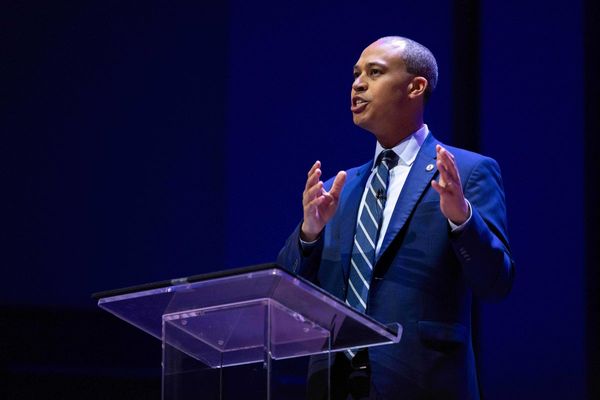Sometimes great leadership is born on the street. That's the lesson of Vladimir Tenev.
Back when Tenev, co-founder and CEO of Robinhood, was a scrappy preteen in Northern Virginia, he had a passion for rough-and-tumble street ball. After one feisty pickup basketball game, he was approached by a man who claimed to be former NBA star Alonzo Mourning's trainer. He saw great potential in Tenev and offered to coach him full-time.
For advice, the young Tenev went right to his parents — who had immigrated to the U.S. from Bulgaria when he was a young boy — and asked them what to do.
"My parents suggested I focus on academics instead," the now 38-year-old told IBD. "So here I am."
Find Your Calling Like Vladimir Tenev
So here he is — one of the most successful executives globally in the dual worlds of cryptocurrency and AI as CEO of Robinhood Markets. The firm he co-founded in 2013 turned the financial services industry upside down by introducing commission-free trading and democratizing access to the markets for millions of investors.
Instead of becoming a street-ball hero, he created a Wall Street game changer.
The Menlo Park, Calif.-based company has 26.7 million customers in 30 countries as of July 31. It has nine revenue streams that each generate over $100 million annually. And under Tenev's leadership, Robinhood's total platform assets have grown to about $298 billion.
Thrive In The Hot Seat
This is why Tenev's take on leadership matters. He's publicly sat in the hot seat, unlike most other CEOs. He has made a serious leadership U-turn at Robinhood that few founders of big investment firms have ever made. Under enormous pressure to show profits when its revenue and stock price were both tumbling, he reversed the company's founding mission from primarily servicing investment novices to ultimately servicing active traders.
"Something I learned from this experience was the importance of letting go of any fear or pride that stopped me from reversing previous business decisions that were no longer serving the company, Robinhood employees or our customers," he said. "I try to continue to live by those principles, and I think the company has benefited from that."
Tenev: Deal With Crisis
But success hasn't come without some high-profile and highly public bumps and bruises.
Back in 2021, Robinhood was at the center of a stock trading controversy that drove up the price of GameStop, which in turn impacted big hedge funds. Robinhood was the key platform used by retail investors to easily buy and sell shares of GameStop, as depicted in the film "Dumb Money."
As GameStop's stock price soared, however, Robinhood temporarily restricted trading. That decision caused a backlash when retail buyers felt Robinhood was protecting big hedge funds instead of individual traders. The company was seen as a sort of reverse Robin Hood, one who was suddenly taking from the poor to give to the rich.
Robinhood's reputation took a serious hit, and as a result the company faced a torrent of lawsuits, fines and government investigations — even as the stock plummeted. Co-founder Baiju Bhatt stepped down as co-CEO and Tenev personally lost a big chunk of his fortune.
Brush Off Criticism
While Tenev claims he's never seen "Dumb Money" in its entirety, he calls the movie "largely a work of fiction." For instance, Tenev is depicted as a drinker, but he says he doesn't drink alcohol. And while actor Sebastian Stan "captured my mannerisms well, it was a bit much to depict me as shirtless for so much of the film."
Fast-forward to mid-July of 2025, when shares of Robinhood surged to a new high. The catalyst was a torrent of investor optimism after landmark cryptocurrency legislation was passed.
Make The Tough Calls Like Tenev
Tenev does not shirk from making tough calls.
He nixed the company's remote-first work strategy despite huge employee blowback. He saw that in-office collaboration was crucial to Robinhood's success. "So we decided to walk that decision back, which was twice as hard as the usual return-to-office efforts," he said.
Few know that better than Taylor Brown, his chief of staff who oversees the office of the CEO. She vividly remembers Tenev's provocative decision that required Robinhood employees to return to work even after the company had clearly established a remote-first work environment back in 2022.
Many employees strongly objected. But Tenev removed himself from all prior decisions, she says, and asked himself: What is the right decision for the company now? "He was not burdened by his past decisions," she said. Never mind that Robinhood lost some top talent when it abandoned the remote-first model.
"He's not afraid to make a hard call," Brown said.
Don't Be Afraid To Grow
Another hard call was back in 2018, with Tenev's decision to add crypto support. At the time, Robinhood was the first regulated broker-dealer to add support for crypto within the same app as more traditional financial assets like stocks and bonds.
"Some questioned why we needed to take a risk and adopt what was at the time considered a speculative asset with an uncertain future," he said. But now crypto is one of its largest business lines.
Sometimes great leadership actions become much more individual — and personal — such as when a key employee tells Tenev they're about to leave the company.
Coaxing that employee to stick with Robinhood is one of Tenev's great leadership assets, says Brown. "He will go on a walk with anyone we're worried about retaining," she said. In fact, she says, they've even coined an internal name for this moment: the Vlad Walk.
"People will turn down money for bigger jobs after a Vlad Walk," she said.
Tenev: Find Your Routine
Tenev has very different motivations for taking walks. Walking — and working out — is how Tenev starts each day. He also journals every day to keep a grasp of his own thoughts, moods and intuitions. And when he finds any opportunity to get out in nature, he grabs it.
"I've found that setting a routine and getting the basics right gets you 80% of the way there when it comes to reducing stress, makes you feel more in control, and sets you up for the future," he said.
Then again, there's nothing routine about Tenev the businessman.
He says that there are three types of business executives: those who are comfortable doing what they're doing, those who simply want to climb the ladder, and those who want to constantly do new things. "I like new challenges and building," he said. "If I'm doing that, then I feel successful."
He says the greatest failing of most executives is when they get too complacent. "When you reach what you view as success, don't get comfortable," he said. "Keep building and innovating as if it's still the beginning."
Put In The Time
Perhaps, Brown says, that's why Tenev is the very last one to leave the office most evenings. He's often the first one to get there, too. "I think it's a pretty good sign if you jump out of bed in the morning and can't wait to begin your day," he said.
For this, he credits his parents. They immigrated from Bulgaria when Tenev was very young and, he says, worked "tirelessly" to establish a life in the U.S. "They made it very clear at a very young age that nothing would be handed to me, and that I needed to work hard and persevere to achieve my goals," he said.
Be An Optimist Like Tenev
Every crisis, Tenev says, has the potential to be a gift in disguise.
It depends on how you respond to the crisis — and what you learn from it. That's why Robinhood will look back on its 2022 period of crisis as a "learning experience" that ultimately led to positive growth. For other business executives who experience a crisis, he suggests embracing it as an opportunity.
"Try to remember this as you're going through it — and I know it may sound strange — but you'll begin to appreciate the crisis as an opportunity and a gift," he said.
Back on the streets of Northern Virginia, where he was once a serious street-baller, he says he has no regrets that roundball was not his ultimate choosing.
Game-changing finance was. And still is.
Keep An Eye On The Future
But he keeps one eye on history, too. In the classic Robin Hood tales, when King Richard returns to the throne, he supposedly restores order and pardons Robin Hood. But that happy turn of events leaves an inquisitive Tenev with a burning desire, he says, to ask these two questions should he ever have the chance to meet the real Robin Hood — if only in his dreams.
"What did you do when King Richard came back?" And, to the heart of the matter, "Did you continue to steal from the rich?"
Vladimir Tenev's Keys
- Co-founded Robinhood in 2013, which is now one of the fastest-growing online brokerage firms.
- Overcame: Regulatory and reputational blowback following the "meme stock" rally and crash.
- Lesson: "Try to remember this as you're going through it — and I know it may sound strange — but you'll begin to appreciate the crisis as an opportunity and a gift."







